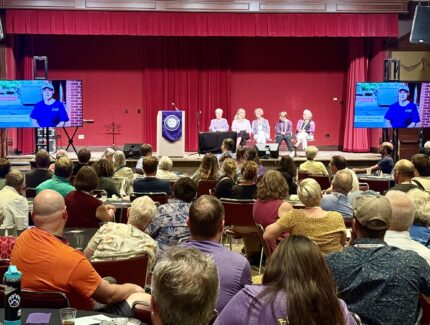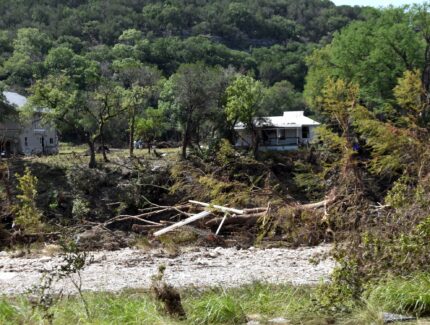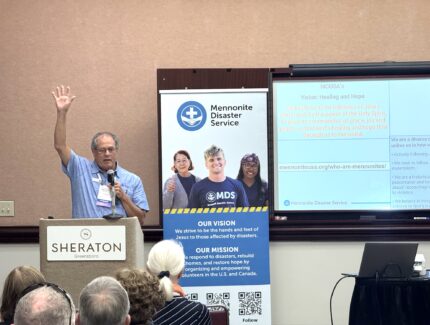


October 19, 2020
A Good Witness to the Community
MDS builds first house in Canada under new COVID-19 protocols
“We told ourselves, before we started, we don’t want to be doing anything we wouldn’t want the media to see if they dropped in announced.”
That’s how Peter Thiessen, co-director with his wife, Susan, for the Mennonite Disaster Service (MDS) Canada project in 70 Mile House, B.C., described their approach at the organization’s first house building project in Canada during COVID-19.
“When the project was over, we wanted to be able to tell a safe, simple and clean story,” says Thiessen, of Okotoks, Alberta.
By all accounts that’s exactly what happened at the project, which began in early August and ended with a home dedication on September 24.
A combined effort of the MDS B.C. and Alberta units, the project—located in a remote area 154 kilometres northwest of Kamloops—found volunteers rebuilding a house destroyed by a wildfire in 2017.
To adhere to COVID-19 guidelines and keep everyone safe, a modified RV project model was used, says Henry Warkentin, who co-directed with his wife, Elizabeth.
For Warkentin, of Coaldale, Alberta, this meant volunteers had their own accommodations and everyone had to practice social distancing or wear a mask when that wasn’t possible. The exception was for couples working together in their own bubble.
Volunteers were also told to use their own tools, he says. When they had to be shared, the tools were sanitized after each use. Everyone who visited the site had to register their names and phone numbers for contact tracing purposes.
Along with the different rules for safe working, mealtimes were different from usual MDS projects, too.
All the food was served by the cooks—no buffet-style line-ups—and volunteers sat to eat at separate tables six feet apart outdoors under an awning, says Susan Thiessen, who served as a cook.
“Those were their tables for the week,” she says, noting the new rules meant the cooks had more work than usual since volunteers weren’t allowed in the kitchen.
“They couldn’t touch anything.”
Another change from normal practice at an MDS project was no group singing. “We still had a devotional each morning,” Warkentin notes.
Despite all the new rules, the project went very well, he says.
“It was hard at first, but as time went on it got easier as we got used to the protocols.”
Abe and Shirley Goetzke of Abbotsford, B.C. served at the project for a week.
“We felt so safe there,” says Shirley. “It was run carefully and efficiently.”
Before they went to 70 Mile House, some family members were worried about the retired couple doing service with MDS during a pandemic.
“We were so glad to come back and say MDS was so careful and the project was so well run,” Shirley says. “It was clear MDS didn’t want to be in the news for causing a COVID outbreak,” adds Abe.
At 46 days from start to finish, the house was completed in record time for MDS, says Peter Thiessen.
“We wanted to get in and out fast,” he says, noting they wanted to limit the amount of time volunteers would be together.
For Warkentin, the project not only met the goal of providing the homeowner with a new house, but it “gave a good witness to the community. We wanted them to know we wanted to work safely, and that we wanted to keep them safe.”
Safety, he adds, “is always a priority at every project. Today, COVID is just one more aspect of being safe for MDS.”
John Longhurst, MDS Canada Communications Coordinator





